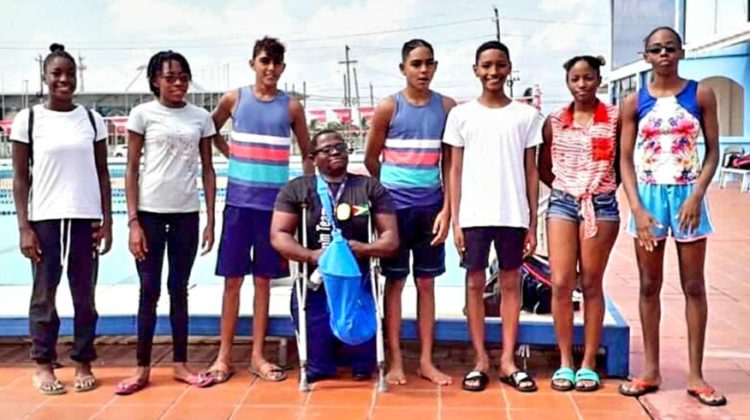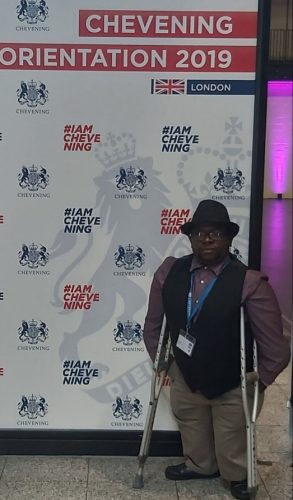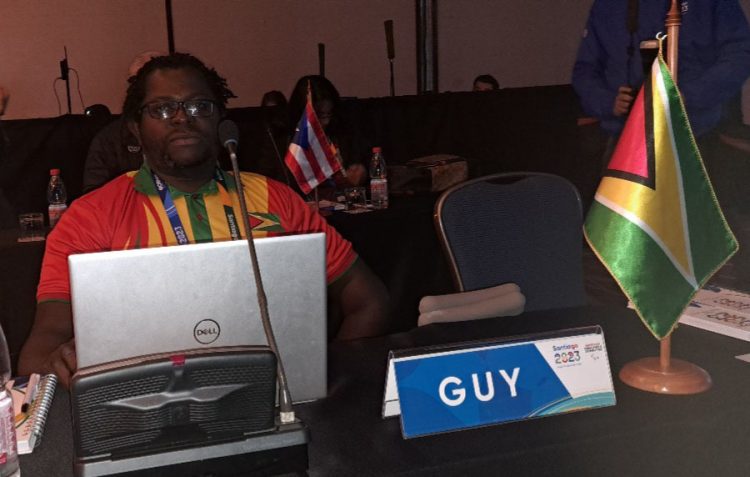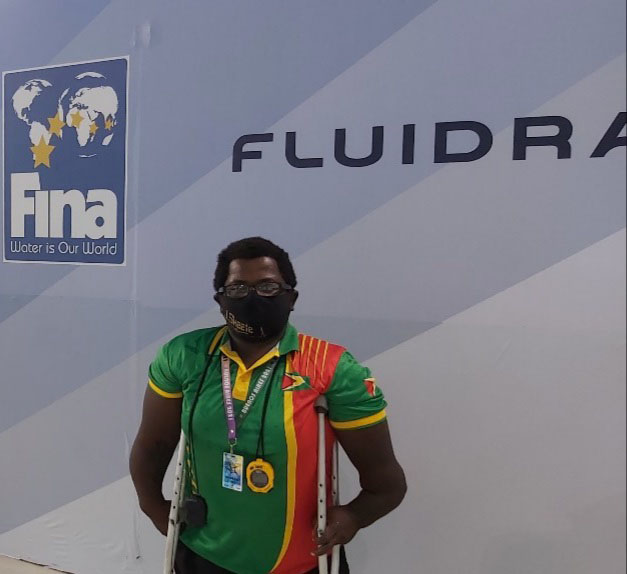A computer engineer, sport performance psychologist and coach by training, Jaime Skeete is a person with a disability who is today, the sports organiser of the University of Guyana and who, in spite of his accomplishments, is often discriminated against by abled people who think the disability will affect his performance.
He has proven them wrong both academically and professionally holding a bachelor’s degree in computer engineering and a master’s degree in sport science. Skeete, who is now in his 40s, was born with osteogenesis imperfecta or brittle bone disease, which causes the bones to break easily at a young age.
“It functions in opposition to what we know as osteoporosis where the bones get brittle as we get older. Osteogenesis imperfecta is a deficiency of calcium in the bone and the older one gets the bones start to get more calcified so the frequency of fractures diminishes. In recent years, I haven’t had those struggles. However, the challenges of having a disability have not escaped me. It continues. There are occasions where persons look at me and think because of my disability, there are things I cannot handle,” he told Stabroek Weekend in a recent interview.

Skeete had his last fracture in 2017. It occurred on the pool deck at the National Aquatic Centre following a heavy storm. When the construction of the facility was completed, he said, the Guyana Amateur Swimming Association (GASA) complained to the authorities that the tiles used on the deck were not non-slip.
“Over the years several people have fallen and hurt themselves because of those tiles. I slipped there on a few occasions but in 2017, I slipped and fractured my ankle,” he said.
His first fracture was as a baby. He has had many fractures throughout his formative years.

Born in Georgetown, he spent the earlier part of his childhood in Perth, Mahaicony where his family originates. He attended Mahaicony nursery and primary schools. His family subsequently moved to Georgetown to ensure he obtained a better education to match his level of school work.
“I was fortunate to meet people in the education system who assisted me to attend a regular school instead of attending a special school for persons with disabilities. A special school would not have met my needs educationally,” he said. His mother, Jean Bullen-Skeete, was a teacher.
He attended Stella Maris Primary from Grade Five where he wrote common entrance examinations and was placed at St Stanislaus College (Saints) where he also successfully wrote several subjects at both the Caribbean Secondary Education Certificate and Caribbean Advanced Proficiency Examinations exams.
He began secondary school a year after he was due to start because of a fracture. “I visited the hospital numerous times over the years because of frequent fractures,” he said.
When he started Saints, the first form was on the top floor. The school brought the class down to the first floor to accommodate Skeete.
“After that first year I sort of grooved in and I continued with the regular second form on the third floor with no more accommodations made just for me. I went through secondary school quite comfortably inclusive of fractures – one at the end of second form and then another at the beginning of third form that sort of interrupted my schooling then. Apart from those interruptions my schooling was quite normal and enjoyable,” he said.
He does not recall being discriminated against at Saints because of his disability. “Maybe there was but I didn’t notice. I got into trouble just like any other young student. The only time that would have been stressful for me were the times I missed school for health reasons,” he said.
Prior to leaving Saints, he joined the school’s scouts group as a venture scout where he was a member for 14 years. He eventually became a scout leader.
“Just before finishing school in 2000 I learned to swim. Shortly after I became a swim instructor. I piloted a learn-to-swim programme for recreation and fitness for the scouts group,” he added.
He learned to swim while doing a work-study stint at the then Guyana Television Company (GTV) now National Communications Network. He had gone to Castellani Pool on Home-stretch Avenue to do a story on the national team preparing for that year’s Goodwill Swimming Championships. After interviewing the coaches, he inquired about the learn-to-swim programme. He joined Dorado Speed Swim Club and competed at club levels. He then completed the Red Cross First Aid Course. His first instructors’ course was a life-saving course facilitated by the Canadian Red Cross Society held at Colgrain Pool.
Thereafter he took advantage of swim instructors’ courses that were made available locally.
“After that I volunteered to be a swimming instructor with various youth groups. Guyana Red Cross Society, the President’s Youth Award Scheme Guyana (PYARG) and Youth Challenge Guyana for a few years between 2001 and 2005. I was a Red Cross volunteer from 2001 to 2005,” he said.
After leaving school, Skeete worked for about 10 months with GTV as a sports reporter from 2000 to 2001.

“As a person with a disability I wasn’t being paid a full salary at GTV because of assumptions. The then human resources manager fought to get me on the normal salary scale but it appeared that the authorities were reluctant. After a number of months of fighting I left,” he said.
Skeete does not think that any workplace today would put a physical disability as the reason why someone cannot earn the full salary for a job where that person executes the duties required.
Bachelor’s degree
After leaving GTV, Skeete volunteered his services with several organisations until he obtained a scholarship to pursue a bachelor’s degree at the Universidad de Ciego de Avila in computer engineering in Cuba through the Cuba-Caricom programme.
He was in Cuba from 2005 to 2011 without returning home during that period.
For the academic year 2006 and 2007 he was adjudged the most outstanding foreign student in the faculty of computer engineering by the Federation of University Students in Cuba.
He recalled that the first time he applied for the scholarship in Cuba, he was unsuccessful.
“Persons used my disability to deny me that opportunity. When I finally spoke with the person who was in charge of the scholarships, not from the ministry, but the organisation that offered the scholarships for eligible persons, she said she thought I wouldn’t have been able to complete the programme because of my disability. These things shouldn’t happen. It wasn’t like I wasn’t qualified academically,” he said.
After returning from Cuba, he was placed at the Ministry of Education in Brickdam where he worked in the management and information’s systems unit from 2011 to 2017 as a computer engineer and programmer.
In 2017 after leaving the Education Ministry, he worked with the Ministry of Public Telecommunications still in computer engineering.
“There, the opportunities were wider in the scope of things. There, minister Cathy Hughes motivated the staff to get the best out of them. I learnt a lot about how to help persons with disabilities in the nitty gritty of information technology. In 2017, I attended a conference in Costa Rica on information and communication technology (ICT) for persons with disabilities,” he said.
On his return he was assigned to promote ICT for persons with disabilities nationally. He organised a workshop for ICT specialists in the various ministries and semi-autonomous agencies, including the University of Guyana and the Guyana Revenue Authority, to course them on how to improve ICT accessibility for persons with disabilities.
“We brought in resource personnel from the international telecommunication agencies to conduct the workshop. That was fruitful and fulfilling. However, I was still working in ICT and not fully engaged in sports, my passion,” he said.
Passion is sports
“My passion for sports began at Saints where I played chess. I represented Saints in several competitions including against St Joseph High, Mackenzie High and the Bishops’ High schools,” he related.
He was also involved in assisting in basketball coaching under the then physical education coach. “We successfully guided Saints to the national schools’ basketball championships in 2004. The coaching bug was biting since then,” he added.
During his time at university in Cuba, he coached and guided the faculty’s team in the inter-faculty sports for two years.
After his return from Cuba, he assisted in resuscitating Dolphin Speed Swim Club that had a dearth of coaches and instructors at the time.
“Myself and then head coach Rawle Collins, brought the club back to a respectable standing with new membership along with the older ones. We raised the level of the club to the point of winning one of the inter-club championships,” he said.
He became head coach of Dolphin Speed Swim Club in 2014/2015.
Over the years, he improved his coaching education through the international swimming body, FINA and the American Swimming Association.
‘‘Subsequently, I had my first national coaching with the national team in 2014. I was the assistant coach for the Goodwill Swim Team… in Suriname. Since then, even though the opportunities have been far and few, it is always a pleasure and an honour to represent my country at that level, even though I never had the chance to do so as a full-fledged swimmer,” Skeete said.
Apart from inter-club competitions, Skeete took part in one competition for disabled persons around 2004/2005 which, he said, had no proper classifications.
“You had my disability going against people who had hearing impairment, people who weren’t physically disabled,” he noted. In that competition he won one gold, two silvers and one bronze medals.
Over the years, he volunteered with the Guyana Teachers’ Union to assist in organising and managing the national swimming championships. He has also functioned as a stroke and turn judge and a referee.
Skeete also served on the executive of the GASA as assistant secretary/treasurer for a period. For a time, he was also in charge of the recording area for swim meets. He also organised meets.
Despite his service to GASA, he feels he faces discrimination from within the organisation.
“One of the reasons I am not allowed to coach the national team especially when my athletes are going to senior international meets is because they don’t think I can handle it. That I also find is ridiculous and quite discriminatory. They do not allow me to travel with my swimmers. That is something they do quite often. To the point where over the years my swimmers would complain about getting less than adequate support when they are at those meets like Pan Am Games, World Championships, both long course and short course meets,” he stated.
This is the second Olympic Games, he said, where one of his athletes is at the games and he was not given the opportunity to travel with his swimmer. In 2020, he coached Andrew Fowler who was given the universality place, but wasn’t given the chance to accompany him to the Olympics. “In 2024, I wasn’t given the opportunity to accompany Raekwon Noel, who I also coached locally,” he stated.
The highest level he has coached swimming nationally and travelled with the team is for the South American Championships that was held in Argentina.
Since 2019 he has been heavily involved in para sports with the Paralympic Committee.
“I attended a training programme in Miami organised by the International Paralympic Committee where one of its arms dealt with development and training. Subsequently we got a table tennis player and a cyclist to represent Guyana at the Para Pan American Games in 2019 in Lima, Peru and in 2023 in Santiago, Chile with a table tennis player,” he said. Guyana also took part in its first Paralympic Games in 2020 in Tokyo with a cyclist; Skeete was chef de mission. He was also chef de mission for the Pan American Games.
Master’s degree
Having gained his bachelor’s degree, he wanted to do a master’s programme in sports, his calling.
“It took some time for the right opportunity to come along,” he said.
In 2019, he was awarded a Chevening Scholarship to study sport science at Bangor University in North Wales, United Kingdom which he successfully completed in 2020. He resigned from the Ministry of Telecommunications to take up that offer.
On his return to Guyana he worked with the Guyana Olympic Association (GOA) as a sport psychology consultant and helped athletes from the various associations prepare for the 2020 Olympics in Tokyo. Through the GOA he worked mainly with boxing. At the same time, he was preparing Fowler for the Olympics.
“I was working with Mr Fowler, not only from the coaching aspect but from the sport psychology aspect as well,” he said.
He continues to coach with Dorado and national teams. He last served as the head coach of the national team that took part in the 2023 Carifta Swimming Championships in Curacao where Team Guyana won five gold medals and set a Carifta record.
From 2022, Skeete joined the University of Guyana as its sports organiser.
“I have been here roughly two years and trying to revitalise, after a partial closure due to Covid-19, the sports programme and continue to develop a sport policy that was started by the previous sports organiser for the university,” he stated.
Following two weeks of engagement headed by a Canadian specialist in creating policy documents with students, faculty staff and other stakeholders, internal and external to the university on where they would like to see the university sport programme, the sports organisers department is now working to produce the draft sport policy document.
Getting UG and tertiary institutions to form a national federation of universities and tertiary institutions is another of Skeete’s aims. A national federation is a prerequisite to becoming a full time member of the International Federation of Universities which is in charge of the World University Games. At the Guyana level, he said, it might be easier to start with track and field and then branch off to multisport. Guyana took part in the World University Games in 2023 in Chengdu, China.









